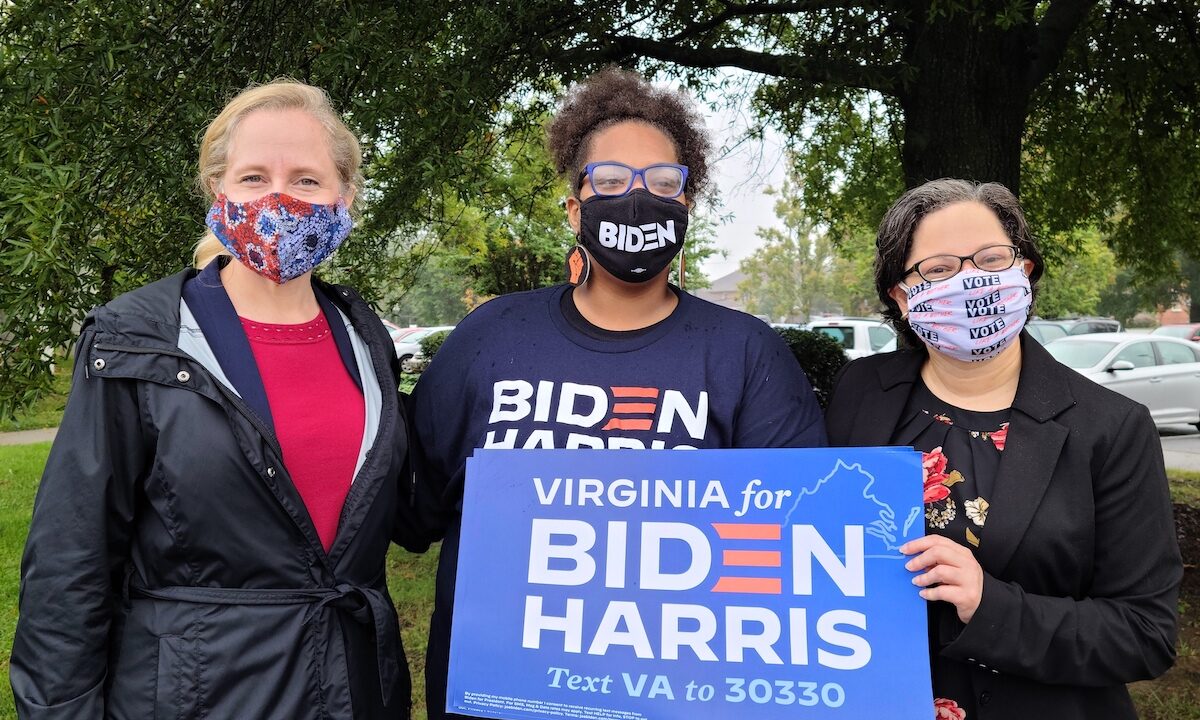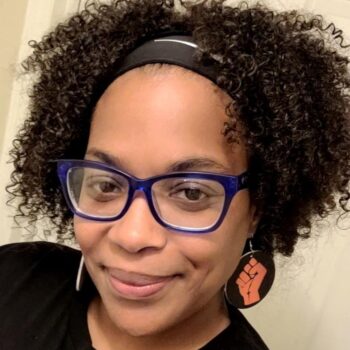On November 8, 2016, I watched in shock as election results came in. As a Black woman in America, I knew the next four years would be difficult, but I wasn’t prepared for the reality of just how much worse things would get.
Like so many others outraged by the election, I attended the first Women’s March on January 21, 2017. I remember feeling energized by the show of solidarity, not just in the United States but around the world. I had always been involved in politics but had never dedicated myself to organizing. In that moment, I realized that my path was shifting. That September, I left the pharmacy where I had worked for 12 years to become an organizer, first with New Virginia Majority and then with the Campaign for a Family-Friendly Economy, Virginia.
I haven’t regretted my decision for one minute, but I have struggled with the ways Black women’s voices, ideas, and leadership are so often diminished in organizing spaces — even when the survival of our democracy is being placed on our shoulders. We answered the call this election cycle, as we always do. But it comes at a price.
This past election, I was a founding member of Women for Biden Digital, a group of women committed to digital grassroots organizing to help Joe Biden win the primary and general election. I served on the diversity team, which aimed to recruit more Black members and members of color to Women for Biden and to ensure that our organizing efforts brought in communities of color in an effective and culturally appropriate way.
I quickly found that the voices of Black women and other women of color were drowned out by the predominantly white leadership. The group was counting on voters of color but didn’t value the ideas and vision put forward by Black women organizers. As is often the case, the diversity team ended up being a superficial solution to create the illusion of equity, diversity, and inclusion without truly tearing down the walls of white supremacy. A group of us decided to branch off to form the Women of Color Coalition for Biden (later Biden Harris), to give women of color a space to build relationships with each other and organize in our own way. Each group maintained its individual identity, with the coalition acting as a bridge that connected us all.
We knew we needed to organize differently to reach Black voters and voters of color, who have been left behind by traditional engagement strategies. We utilized the relationships we’d forged within our communities to build out our organizing. Rather than merely asking voters to support a candidate, we engaged them on the most pressing issues facing our communities and created space to discuss real solutions — integrating civic education with civic engagement.
Here are some of the most effective strategies we used to engage Black voters and other voters of color:
-
Social Justice Book Club. We held online discussions about videos and articles related to social and racial justice that could also be linked to Biden’s policy agenda items. The book club served as a safe space for uncomfortable conversations around racial justice. Our goal was to engage a mixed audience with women of color leading the conversations.
-
The State of Women of Color Roundtables. Our roundtables (streamed over Facebook Live) focused on a range of topics that highlighted women of color’s accomplishments and points of view. We took on public policy, mental health, voting rights, and women’s rights from Black women’s perspectives. Mental health was a big focus throughout the year. Our roundtable on mental health was viewed by 2,000 people and lasted over two hours.
-
Phone banks. Phone banks focused on restoring voting rights, registering to vote, and re-registering voters (overwhelmingly Black and brown people) who had been dropped from the voting rolls. We created a welcoming virtual environment and had fun calling other voters of color and talking about the issues that impact all of us.
-
Events. We held a number of virtual events aimed at bringing our communities together. For instance, we hosted virtual DNC Convention watch parties in which we joined forces with Broadway for Biden to increase outreach and engagement. We also put together an event called Momala Fest, a celebration of Vice President Kamala Harris’s birthday that also lifted up women of color working in the political world. In addition, we held Zoom check-ins for organizers of color to vent and take care of each other. Organizers of color are always hard on ourselves, so it’s critical to create spaces where we can remind ourselves that we are doing a damn good job. It shows in the results.
The Biden campaign was incredibly supportive of our work. They gave us resources, a campaign staffer, access to platforms to use for events, a YouTube channel, and the space to organize our way without interference from the campaign. This level of support and autonomy is critical moving forward. Creating organizing spaces for Black women should be a must, not an option.
Black women are the most dependable voting bloc for the Democratic Party. We show up consistently and put in countless hours of volunteer labor. If we want to make real progressive change, racial justice must be at the center of any legislative action. Black women organizers need the resources and support to organize our way. We know how to organize: from coast to coast, we increased voter registration, voter engagement, voter education, and voter turnout. And we did it our way — by being open and honest and building lasting trust within our communities.
One thing I have learned over the years: sometimes it isn’t the message that needs to change but the messenger. To my Black women organizers, always stand firm in your truth. Stay true to yourself and our community. Remember, no one can tell your story like you can tell it. Know your worth and stop apologizing. We are finally starting to be recognized and respected; do not stop now.
***
On January 20, 2021, the world wept with us again, this time for a very different reason: a celebration. We celebrated together as we made history with the swearing in of the first Black and Asian woman Vice President. But while Vice President Harris may be the first, she will not be the last.

